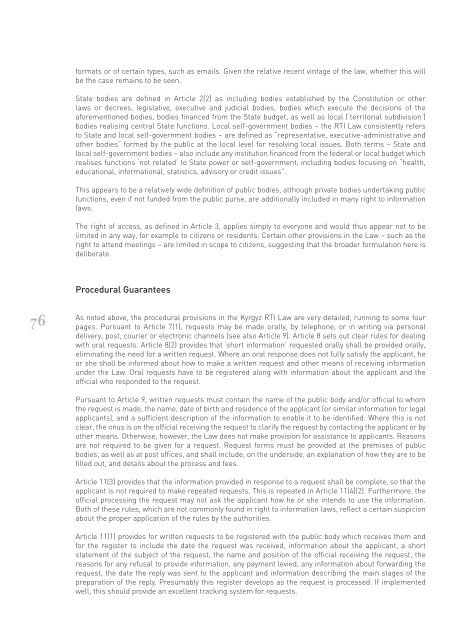Freedom of Information: A Comparative Legal Survey - Federation of ...
Freedom of Information: A Comparative Legal Survey - Federation of ...
Freedom of Information: A Comparative Legal Survey - Federation of ...
Create successful ePaper yourself
Turn your PDF publications into a flip-book with our unique Google optimized e-Paper software.
76<br />
formats or <strong>of</strong> certain types, such as emails. Given the relative recent vintage <strong>of</strong> the law, whether this will<br />
be the case remains to be seen.<br />
State bodies are defi ned in Article 2(2) as including bodies established by the Constitution or other<br />
laws or decrees, legislative, executive and judicial bodies, bodies which execute the decisions <strong>of</strong> the<br />
aforementioned bodies, bodies fi nanced from the State budget, as well as local (‘territorial subdivision’)<br />
bodies realising central State functions. Local self-government bodies – the RTI Law consistently refers<br />
to State and local self-government bodies – are defi ned as “representative, executive-administrative and<br />
other bodies” formed by the public at the local level for resolving local issues. Both terms – State and<br />
local self-government bodies – also include any institution fi nanced from the federal or local budget which<br />
realises functions ‘not related’ to State power or self-government, including bodies focusing on “health,<br />
educational, informational, statistics, advisory or credit issues”.<br />
This appears to be a relatively wide defi nition <strong>of</strong> public bodies, although private bodies undertaking public<br />
functions, even if not funded from the public purse, are additionally included in many right to information<br />
laws.<br />
The right <strong>of</strong> access, as defi ned in Article 3, applies simply to everyone and would thus appear not to be<br />
limited in any way, for example to citizens or residents. Certain other provisions in the Law – such as the<br />
right to attend meetings – are limited in scope to citizens, suggesting that the broader formulation here is<br />
deliberate.<br />
Procedural Guarantees<br />
As noted above, the procedural provisions in the Kyrgyz RTI Law are very detailed, running to some four<br />
pages. Pursuant to Article 7(1), requests may be made orally, by telephone, or in writing via personal<br />
delivery, post, courier or electronic channels (see also Article 9). Article 8 sets out clear rules for dealing<br />
with oral requests. Article 8(2) provides that ‘short information’ requested orally shall be provided orally,<br />
eliminating the need for a written request. Where an oral response does not fully satisfy the applicant, he<br />
or she shall be informed about how to make a written request and other means <strong>of</strong> receiving information<br />
under the Law. Oral requests have to be registered along with information about the applicant and the<br />
<strong>of</strong>fi cial who responded to the request.<br />
Pursuant to Article 9, written requests must contain the name <strong>of</strong> the public body and/or <strong>of</strong>fi cial to whom<br />
the request is made, the name, date <strong>of</strong> birth and residence <strong>of</strong> the applicant (or similar information for legal<br />
applicants), and a suffi cient description <strong>of</strong> the information to enable it to be identifi ed. Where this is not<br />
clear, the onus is on the <strong>of</strong>fi cial receiving the request to clarify the request by contacting the applicant or by<br />
other means. Otherwise, however, the Law does not make provision for assistance to applicants. Reasons<br />
are not required to be given for a request. Request forms must be provided at the premises <strong>of</strong> public<br />
bodies, as well as at post <strong>of</strong>fi ces, and shall include, on the underside, an explanation <strong>of</strong> how they are to be<br />
fi lled out, and details about the process and fees.<br />
Article 11(3) provides that the information provided in response to a request shall be complete, so that the<br />
applicant is not required to make repeated requests. This is repeated in Article 11(4)(2). Furthermore, the<br />
<strong>of</strong>fi cial processing the request may not ask the applicant how he or she intends to use the information.<br />
Both <strong>of</strong> these rules, which are not commonly found in right to information laws, refl ect a certain suspicion<br />
about the proper application <strong>of</strong> the rules by the authorities.<br />
Article 11(1) provides for written requests to be registered with the public body which receives them and<br />
for the register to include the date the request was received, information about the applicant, a short<br />
statement <strong>of</strong> the subject <strong>of</strong> the request, the name and position <strong>of</strong> the <strong>of</strong>fi cial receiving the request, the<br />
reasons for any refusal to provide information, any payment levied, any information about forwarding the<br />
request, the date the reply was sent to the applicant and information describing the main stages <strong>of</strong> the<br />
preparation <strong>of</strong> the reply. Presumably this register develops as the request is processed. If implemented<br />
well, this should provide an excellent tracking system for requests.
















